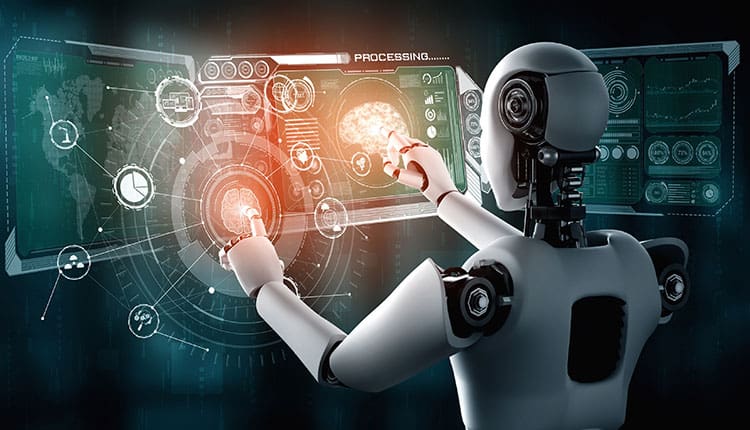We might generate income when you click on links to our partners. Learn More.
What is artificial general intelligence (AGI), and why does it matter? As one of the most talked-about subjects in innovation today, it has triggered a race among leading business like OpenAI and Google to turn this advanced idea into reality. Understanding AGI is necessary since it has the potential to revamp markets, affect our society in profound methods, and change the method we interact with technology. Here's what you need to understand about what it may be able to do, how it may transform markets and fields, and the substantial challenges facing its advancement.
KEY TAKEAWAYS
• AGI differs from traditional AI in essential methods in that it would be able to believe, find out by itself, and adapt to brand-new challenges like people unlike standard AI, which is designed for specialized jobs and runs within a minimal scope. It needs human beings to update and fine-tune capabilities. (Jump to Section).
• Once it becomes a reality, AGI would have the ability to make amazing advances in several fields, consisting of healthcare, research study, and financing sectors. (Jump to Section).
• Creating AGI is challenging due to the research study challenges that include technical, ethical, and social concerns. Addressing these challenges is main to maintaining the safe and positive development of this technology. (Jump to Section)
Featured Partners: Artificial Intelligence Software

Discover more
TABULATION
What is Artificial General Intelligence (AGI): A Clear Definition.
Understanding AGI vs Traditional AI.
Potential Applications of Artificial General Intelligence.
Challenges in Artificial General Intelligence Research.
3 Introductory AGI Courses to Consider.
Frequently Asked Questions (FAQs).
Bottom Line: Why Knowing What Is Artificial General Intelligence Matters.
What is Artificial General Intelligence (AGI): A Clear Definition
Artificial basic intelligence, or AGI, refers to a kind of synthetic intelligence (AI) that can translate, learn, and perform any cognitive job that a human can do. Unlike today's AI, which is developed to deal with particular tasks like recommending products or processing information, AGI would have the ability to adjust to new challenges and apply understanding across various fields. In other words, this sophisticated type of AI would think and reason like a human. While AGI holds great possible, it deserves keeping in mind that it is still an idea today, without any totally established systems offered yet.
Key Capabilities of Artificial General Intelligence
AGI would have a variety of capabilities that imitate human intellectual functions, so it can carry out jobs beyond the narrow focus of the present AI tools in the market. Some crucial capabilities include the following:
Human-Like Reasoning: The innovation would have the ability to understand and make choices the way humans do. It would believe seriously, solve issues, and create solutions based on its own experiences and previous interactions, comparable to how we apply past understanding to brand-new circumstances.
Solving Unfamiliar Problems: One of AGI's strengths is its potential to take on new issues. Unlike standard AI, bytes-the-dust.com which is trained to carry out specific tasks, AGI would have the capacity to handle issues it hasn't been straight trained to fix. It could figure out how to approach a completely new challenge, similar to people do when faced with something we've never encountered before.
Self-Learning and Adapting: AGI might tweak its abilities and gain from experience, without the need to be manually updated each time. It would observe and examine information, gain from errors, and find better ways to finish jobs in time. This suggests AGI could adapt to new scenarios and get much better at tasks on its own.
Using Knowledge Across Different Areas: AGI would be able to take what it discovers in one area and bphomesteading.com use it to other jobs. For example, if it discovered how to solve math issues, it might use that understanding to attend to obstacles in other fields, like science or service. The capability to transfer abilities throughout different areas is something people do naturally and would make the innovation flexible in diverse sectors.
Understanding and Reacting To Emotions: Recognizing and reacting to human emotions would likewise be within AGI's capabilities. This would be essential in settings where comprehending people's sensations matters, such as healthcare, customer service, or social circumstances. By reacting to emotions properly, AGI would be much better equipped to work with human beings in an effective way.
Understanding AGI vs Traditional AI
The table listed below offers a picture of the significant distinctions between AI and conventional or narrow AI by highlighting their abilities, versatility, and present status.
AGI would have the ability to think, find out autonomously, and adapt to brand-new obstacles like humans. However, it is still theoretical and has actually not been understood yet. On the other hand, conventional AI is developed for specific tasks and runs within a repaired scope. It can not get used to brand-new jobs without human input.
For example, an AGI might discover to detect medical conditions, then utilize that understanding to establish tailored treatment plans-and even adjust its technique based on the patient's development. Additionally, it could use this problem-solving ability to tasks in completely different fields, such as developing company techniques or encouraging on ecological conservation. In contrast, conventional AI, like a diagnostic tool, can only examine medical data for particular conditions. It can not adapt to other locations or improve on its own.
Potential Applications of Artificial General Intelligence
While AGI isn't here yet, its prospective applications cover many fields and hold excellent guarantee of drastic developments in numerous sectors. Without being restricted to particular tasks like narrow AI, AGI would be highly flexible and might use its capabilities to resolve multi-disciplinary issues. It might conquer difficulties currently beyond the capabilities of existing AI applications.

Transforming Healthcare
AGI would change the game in healthcare by identifying complex and rare diseases with higher accuracy, even in cases where symptoms are ambiguous or overlap with several conditions. It could produce extremely personalized treatment plans by studying client history, genetic details, and real-time health information. In addition, AGI might accelerate drug discovery, identifying possible treatments in weeks rather than years by processing massive datasets and running predictive simulations.
Advancing Scientific Research
In scientific research study, AGI would be able to mimic experiments, analyze complex datasets, and produce hypotheses. It might accelerate breakthroughs in quantum physics, genomics, and environment science. By incorporating knowledge from numerous domains, the technology might discover connections and solutions that might otherwise go undetected by traditional AI.
Improving Industry
Organizations in the commercial field might utilize AGI to boost performance in real-time by handling entire supply chains. It would anticipate and deal with disruptions before they happen. In production, it could manage autonomous factories, optimizing production procedures while preserving security and quality requirements. Its capability to get used to altering circumstances would make it an important tool in industrial environments.
Enhancing Business Strategy

AGI could enhance company decision-making by evaluating market trends, customer behavior, and functional information to discover opportunities and risks. In contrast to narrow AI systems, AGI would innovate solutions to difficult service problems, such as dealing with financial uncertainty or forecasting long-term market shifts. Its ability to gain from diverse sources would empower businesses to remain competitive.
Redefining Finance

In the monetary sector, AGI could increase forecasting precision by identifying patterns in large quantities of monetary information, so investors and organizations can make informed choices. It would likewise have the ability to identify fraud in real-time by recognizing subtle anomalies that standard AI systems may miss. Additionally, AGI might construct more robust financial models, factoring in complex variables and situations to mitigate risks.
Challenges in Artificial General Intelligence Research
Developing AGI is one of the most enthusiastic goals in technology, but it includes many difficulties. These obstacles consist of technical, ethical, and social areas, making AGI development a complex and multi-faceted procedure. Overcoming the following difficulties is identical to ensuring safety, promoting ethical requirements, and carefully preparing how AGI's intro and usage will impact individuals, markets, and society as a whole:
Making AGI Truly Flexible: AGI would need to handle a wide variety of issues and adapt to new scenarios, just like human beings. Building a system of flexibility is exceptionally difficult because current AI tools are not developed to think or learn at this level of sophistication.
Massive Computing Needs: To reproduce human intelligence, AGI would need enormous amounts of computing power to procedure details from diverse sources quickly. Determining how to make such systems powerful and efficient enough for real-world usage is a significant challenge.
Understanding Human Intelligence: We do not fully comprehend how human believing works, especially complicated aspects like instinct or awareness. Without this understanding, it's challenging to develop devices that can replicate human-like thinking.
Making AGI Safe and Ethical: AGI might potentially be misused, like to develop prejudiced systems or hazardous tools like self-governing weapons. Researchers must ensure that AG is developed responsibly and follows rigorous ethical guidelines. This is a difficult task that necessitates worldwide partnership.
Keeping It Under Control: There's a threat AGI could act in ways we do not anticipate, specifically considering that it would have the capability to learn and change with time. Ensuring that these systems stay aligned with human values and are safe to use is one of the greatest obstacles in AGI research study.
Impact on Jobs and Society: If AGI ends up being a reality, it could change tasks or cause economic inequality by benefitting some groups more than others. Getting ready for these social effects is simply as important as developing the innovation itself.
High Costs and Resources: Researching AGI demands a great deal of cash, time, and professional knowledge. Not all companies have these resources, decreasing progress and leaving smaller services out of the race.
3 Introductory AGI Courses to Consider
Familiarizing yourself with AGI can give you a competitive edge, whether you wish to advance your career in AI or merely wish to remain informed about emerging technologies. The following initial courses can help you get a much deeper understanding of what synthetic general intelligence is, so you can solidify your knowledge about this appealing AI improvement.
Artificial General Intelligence (AGI): An Initial Course on Udemy
This Udemy course offers a basic understanding of AGI, appropriate for beginners without any previous experience. The course covers pertinent topics, including the foundations of AI, the fundamentals of AGI, and the most recent patterns in the field. It likewise explores the benefits, threats, and difficulties related to AGI, equipping you with insights into what the sophisticated technology can accomplish. The whole course includes 15 lectures and can be finished in approximately 45 minutes. Upon conclusion, you will get a certificate to strengthen your credentials in the job market. This introductory course costs $24.99.
Intro to Artificial General Intelligence (AGI): Future of AI on Udemy
Udemy's initial course offers a comprehensive summary of AGI for students without any technical background. It goes over the historic context and foundation of AGI, the distinctions in between narrow AI and AGI, and ethical factors to consider surrounding its development. In addition, it resolves future trends in AI and AGI, shedding light on the challenges and opportunities that lie ahead. Spanning one hour and 46 minutes, the course consists of 39 lectures, on-demand video, and downloadable resources. It likewise has a dry run at the end to enhance your understanding. You will be awarded a certificate when you complete the course. It is available as part of Udemy's premium plans, starting at $20 per month, or as a different purchase of $49.99.
Artificial General Intelligence (AGI) on Udemy
This Udemy course brings a clear and concise introduction to the topic, with on-demand videos and 22 lectures. It elaborates on significant AGI concepts and the function of robotics in AGI development. It likewise analyzes the ethical, software, and hardware difficulties in producing AGI. The course supplies quizzes to check your understanding and a certificate of completion. Priced at $44.99, it is produced students at any level, making it accessible and valuable for anybody who desires to find out more about AGI.
Frequently Asked Questions (FAQs)
Achieving AGI might reinvent industries, enhance decision-making, and cause significant advancements in technology. However, it likewise raises issues about principles, task displacement, and the requirement for proper policy to ensure it is developed securely and properly.
Experts disagree on how far we are from attaining AGI. Sam Altlman of OpenAI believes in 2025, AI agents may sign up with the workforce, ultimately leading the way to AGI advancement. On the other hand, a study of AI researchers puts the average estimate around 2047. Despite quick AI improvements, existing systems are still limited to narrow jobs and do not have the broad, flexible thinking of humans-so AGI is likely still decades away.
The idea of AGI completely replacing humans is still disputed. Although it's most likely that AGI will assist us by taking control of repetitive tasks, there is a possibility that it could displace specific tasks. That stated, rather than totally changing humans, AGI is anticipated to work together with us, dealing with technical obligations while we concentrate on tasks that require imagination and empathy. At the end of the day, the impacts of AGI will depend upon how society chooses to manage and integrate it.
Bottom Line: Why Knowing What Is Artificial General Intelligence Matters
Understanding artificial general intelligence is crucial due to the fact that this innovation could alter markets, resolve hard problems, and change how we use AI. But as we start to develop AGI, we should carefully address numerous obstacles, including technical issues, ethical concerns, and its overall effect on society. By finding out about AGI's potential and dangers, we can pursue making sure it is created properly and used in manner ins which would benefit everyone.








